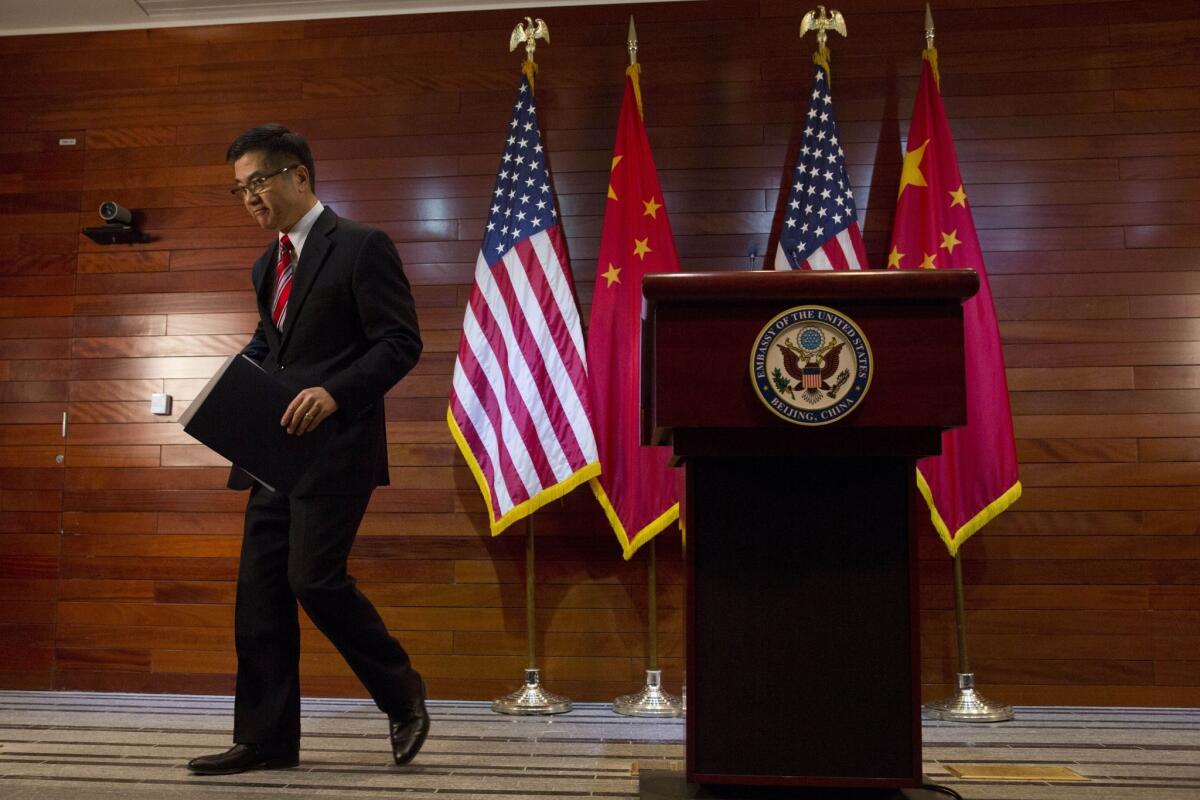Ambassador Locke reflects on time in China as he heads for the exit

BEIJING -- As the United States’ first Chinese American ambassador to China, Gary Locke made an impression on many ordinary people here with his down-to-earth ways – carrying his own backpack, paying for his Starbucks with a coupon and flying economy class.
His man-of-the-people demeanor, honed as two-term governor of Washington state, provided a sharp contrast to the often-remote and sometimes corrupt ways of the Chinese ruling class. Many netizens approved of his style, but a number of media organs affiliated with the Communist Party were discomfited by the unassuming envoy. (His appointment, one even suggested early in his tenure, may be an “evil” U.S. plot to use a Chinese person against Chinese and “instigate political turbulence” in China.)
With his 2½-year term in Beijing coming to a close this week, Locke on Thursday reflected on the accomplishments and challenges of his tenure and urged Chinese to visit the U.S. “to see firsthand our freedoms, our diversity, our democracy – the dynamism and creativity of America.”
Through such trips, Locke said at a news conference at the U.S. Embassy, he hoped “that they’ll want some of those same things here in China, or that they’ll understand what is possible here in China.”
Locke, who is being succeeded by longtime Sen. Max Baucus (D-Mont.), stressed accomplishments such as increasing trade ties and decreasing visa processing times for Chinese seeking to study, do business or travel in the United States.
In the last two years, he noted, Chinese investment in the U.S. has exceeded the total from the previous 11 years combined, while American exports to China have grown at almost twice the rate as exports to the rest of the world.
Nevertheless, Locke faced a number of sticky issues during his time at the helm, such as when civil rights activist Chen Guangcheng sought refuge at the embassy in 2012 after fleeing house arrest; he was eventually granted a visa to study stateside.
Locke described the incident as “one of the highlights” and, in a locution that may set a new high bar for diplomatic speech, called it “a testament to how we were able to work with the Chinese government on addressing a very sensitive human rights matter.”
Deepening U.S.-China economic ties serve as a “steadying influence” on overall relations between the two nations, Locke said, and he added that Beijing and Washington were making progress on a bilateral investment treaty.
Nevertheless, Washington is concerned about a recent increase in arrests of activists and journalists in China, he added, including that of Ilham Tohti, a scholar and advocate for minority Uighurs who was charged this week with separatism.
“We know there has been great prosperity and an increase in the quality of life, the standard of living here in China. But human rights is more than just economic prosperity and economic conditions of people,” Locke said, a reference to frequent reminders from Chinese officials that government development programs have brought more modern amenities to areas such as Xinjiang, a heavily Uighur area in far western China that has been rocked by violent clashes.
He also said the U.S. wanted to see “more equitable treatment of foreign journalists in China, giving them the freedom to report honestly, both the good and bad points in China, just as Chinese journalists enjoy these freedoms in our country.”
A number of foreign news organizations that have published hard-hitting reports looking at the wealth amassed by senior Chinese leaders and their families, including the New York Times, have seen reporters denied visas.
Locke applauded Chinese leaders for taking a greater interest in strengthening the rule of law. Responding to a question about wealthy Chinese stashing money in offshore accounts and going abroad to give birth to children, he said such behavior reflects a lack of confidence among people here that their “hard earnings will be protected, that there’s strong protections for intellectual property rights, that if there are grievances, there’s a fair, neutral, transparent manner in which these business disputes can be resolved.”
“Oftentimes,” he added, “it’s motivated by a desire for stability, predictability and security.”
Switching to regional Asian issues, Locke urged China and Japan – who recently have been reopening old wounds from World War II and sparring over control of islets – to “lower the temperature and focus on diplomacy.”
China on Thursday designated two national memorial days – one for the Victory in the Anti-Japanese War and another to victims of the Nanjing Massacre.
Baucus is expected to arrive in Beijing in the next few weeks. Asked if he had ambitions to run for vice president on a 2016 ticket with Hillary Rodham Clinton, Locke demurred.
“I will be very active in helping other candidates but I have no intention of being a candidate for any other office myself,” he said.
Twitter: @JulieMakLAT
More to Read
Sign up for Essential California
The most important California stories and recommendations in your inbox every morning.
You may occasionally receive promotional content from the Los Angeles Times.











